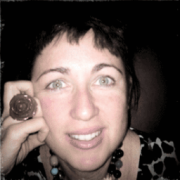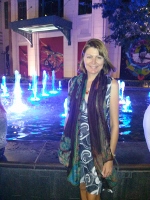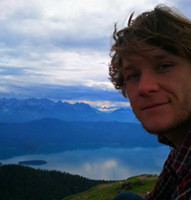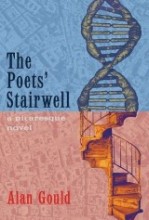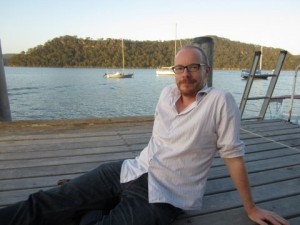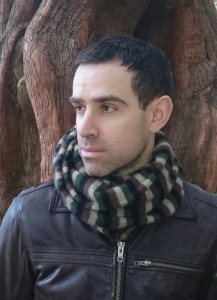 James Byrne is a poet and editor, born near London in 1977. His most recent poetry collections are White Coins (Arc Publications, 2015) and Everything Broken Up Dances, Tupelo Press 2015. Other collections include Blood/Sugar (Arc 2009) and Soapboxes, a pamphlet of political satires (KFS, 2014).
James Byrne is a poet and editor, born near London in 1977. His most recent poetry collections are White Coins (Arc Publications, 2015) and Everything Broken Up Dances, Tupelo Press 2015. Other collections include Blood/Sugar (Arc 2009) and Soapboxes, a pamphlet of political satires (KFS, 2014).
Byrne is a translator and editor. He co-edited the first anthology of Burmese poetry to be published in the West (Arc, 2012, Northern Illinois University Press 2013) and Voice Recognition: 21 Poets for the 21st Century, an anthology of poets under 35, published by Bloodaxe in 2009. Since 2002 he has edited The Wolf, an internationally-renowned poetry magazine.
His poems have been translated into various languages, including Arabic, Burmese and Chinese. In 2009 he won the Treci Trg poetry prize in Serbia and, as a result, his Selected Poems: The Vanishing House was published in Belgrade. He was the Poet in Residence at Clare Hall, University of Cambridge and a Stein Fellow of New York University where he completed an MFA in poetry.
Currently living in Liverpool, England, he teaches poetry at Edge Hill University.
Home
They said I came out with a thorn in my foot—
hillcloud child who spoke with a large name,
blossy among broken hedges and molten fields.
When the house hellbelled I retouched an image
of hyaline mists gridlocked to corn. The memory
of sky over Pankridge Farm held like a salve.
I listened to the beginning patience in a voice
until it was clamant, exasperated to pure nerve—
‘Home’ it repeated. ‘Home. Come home’.
from ‘Economies of the Living’
The Eagle
Yeats in his psychopomp. Blavatsky
a lion among quadrapets. Similitudes.
As if accolades were lofty as cliffs.
Maud Gonne pursued, but as worthy
conquest? I would rather be a falcon
or rook, with mischief to provoke her.
Brother, remember how we cast ourselves
as children carried off by Scottish eagles.
Found affrighted but reclaimed by parents.
The Hummingbird
Hazelnut. Feathered black, brownish and
green. Traitor to the flower press, luxuriant
but uselessly sportive, uselessly fluttering.
Female’s the architect. Male: a panicked
fetcher of cottoned twigs, vegetable fibres.
Skivvy for cloudhouses suspended in air.
A family of silken music caged by Labat
for rats. We are purposed for pleasure.
Touch the wings to kill its instrument.
The Horse
Europe’s incommode: it is not free
to roam continents like the horse did.
Tack, yield, never knowing winter.
Turnstiled like prisoners of the sedan.
Tractable and familiar. The Bedouin
shares his tent with foals, surrenders
his courser mare to the French consul.
The things a horse has traded for gold.
Closely farried, shockpools for eyes.
The Orangutan
Brute like us. Brute of the woods.
Sternly countenanced then maligned
like cracked hutches of the counselled.
Epitaphic, ritualized buriers and so
larger than most men. Upwards of you
unfolding a napkin and as Buffon said:
fond of comfits but, unlike the baboon,
clever to show a man where the door is.
Trained servants, able to work as we do.
from ‘Rimbaud Villanelles’
14 Rue Nicolet
What is wrong with the ex-pats and the French?
Only two of us show up for The Rimbaud Walk
despite the ballyhoo: A 5 Mile Drift on Absinthe.
Sure, there’s a grin in the wind, but what prudence
nowadays; no surprise the UMP still shun a plaque
for 14 Rue Nicolet. What is wrong with the French?
Rimbaud, at sixteen, arrived here from the Ardennes
for havoc in the house of Verlaine’s new stepparents,
and for Verlaine himself, who was gone on absinthe.
At night, they stumbled home under the low-lit lamps
surveyed by Verlaine’s jilted chanson, Mathilde Mauté,
who despised the bad manners of these mountain French.
It is a house too prim for bohemians or boy peasants
agreed the in-laws. Lice-ridden, Rimbaud slept on the lawn
naked in the sun, peeled to his ribs, popeyed on absinthe.
Mathilde saw her life slide away whilst pregnant.
Verlaine threw little Georges at the wall and walked.
This house is a shamed house, censored by the French.
Before Rimbaud, Verlaine was hooked on absinthe.
Selected from White Coins, Arc, 2015
Variations on Darkness
‘How slowly dark comes down on what we do.’
Theodore Roethke, from “In Evening Air”
1.
If you drink from the shuck of the storm
you will always be tainted by its darkness.
2.
The lacquered surface of the canal at night
is darker than the darkest shroud of Jesus.
3.
One thing darker than the roses’ shadow
—the cold fire of the roses after thunder.
4.
Far murkier than possession—the shiphold
shackled to the hells of human darkness.
5.
When the rusted machete cut back the cane
it sharpened darkly in the emperor’s silence.
6.
Amnesially waiting in the cinema’s darkness
—it cannot be separated out from loneliness.
7.
The panmongolist was so afraid of the dark
he asked to be buried in a candlelit coffin.
8.
A death-pecked cry darkens the entire city
and is hoisted through the shrieking world.
Fragments for Ali
lend me a syllable
from Assyrian ash
from the ashes of Ishtar
unruffle my birdsnest ignorance
Ali
you who brothered me there
like a son and bronzed silver
into figures of amity
in the desert path above Tartous
through salt tides
and toothsucking sand
the bell of your name
Ali
*
hardbreathing of pebblestones
promises
lost to the iron-shore sea
the upturned hulls
of fishing boats
wet with life
as if hope struck
suddenly
and was bundled out by the sun
*
winter ices the weathervane
ditch-lilies
in the Alawite district
where your ailing mother lives—
reproach of the tank’s eye
death-chills
tingling the museum gates
and somewhere beyond the pocked wall
and somewhere beyond the General’s spyglass
among shelled-out newbuilds
and frail city stanchions
your son walks
the herded miles
*
blood in the jasmine
sweat of death
………………….
……………..…
how do new buds grow
from beheaded flowers?
*
families hide out for months
in their homes
insomnia-riven
betrayed by the dark
and the painted
irreality of television
relatives names
on blacklists
in windows purloined
of the old familiar faces
*
where in these Mallajah hills
is the lamb of your niece?
sorrow of the olive grove
bones that conspire in the Queiq river
*
an amphitheatre
labored over
brick-by-brick
now cordoned
where the villagers
cannot be sure
of the informers
from the mob
school-less children
stare out from
pillars of rock
to the distant
grey Mediterranean—
mesh of Europe
*
to speak is a game of chess
terror in the telephone
where no one appears to
listen
dread of breath
silence that roars
The National Park
Imperious eyes of the trained killer
draped in a white flag, who would
maculate us with the venom of his clan.
Here, where death is the stone inside
a rotting fruit; what would they ask
if not turning away at the final demand,
which is speech? They enter the gable
of the national park and do not tell us
and are with themselves and are gone.
Selection from Everything Broken Up Dances (forthcoming from Tupelo Press, USA)
 Omar J Sakr is an Arab Australian poet whose work has appeared in Meanjin, Overland, Cordite Poetry Review, and Tincture Journal, among others. His poems have been translated and published in Arab, and he has been shortlisted for the Judith Wright Poetry Prize as well as the ACU Poetry Prize.
Omar J Sakr is an Arab Australian poet whose work has appeared in Meanjin, Overland, Cordite Poetry Review, and Tincture Journal, among others. His poems have been translated and published in Arab, and he has been shortlisted for the Judith Wright Poetry Prize as well as the ACU Poetry Prize.
